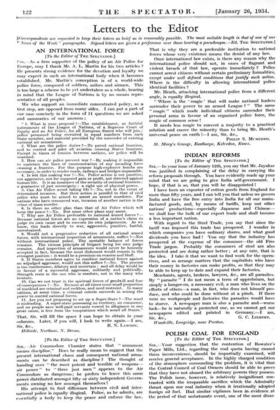Letters to the Editor
[Correspondents are requested to keep their letters as brief as is reasonably possible. The most suitable length is that of one of our !` News of the Week " paragraphs. Signed letters are given a preference over those bearing a pseudonym.—Ed. THE SPEcricron.1
AN INTERNATIONAL FORCE
[To the Editor of THE SPECTATOR.]
it,—As a firm supporter of the policy of an Air Police for Europe, may I thank Mr. A. L. Martin for his two articles ? He presents strong evidence for the devotion and loyalty we may expect in such an international body when it becomes established. Mr. Martin's conception is of a world-wide police force, composed of soldiers, sailors and airmen. This is too large a scheme to be yet undertaken as a whole, bearing in mind that the League of Nations is by no means repre- sentative of all peoples.
We who support an immediate concentrated policy, as' a first step, are opposed from many sides. I can' put a part of our case concisely in the form of 11 questions we are asked and summaries of our answers :
" I. What is your proposal 1—The establishment, as faithful instruments of the League of Nations, of a Supreme Court of Equity and an Air Police, for all European States who will join : police personnel being recruited in equal numbers from each State member, and material provided by the surrender of existing national air armaments.
2. What are the police duties 1—To patrol national frontiers, and to control and pilot all aviation crossing States frontiers. Except in times of tension between nations, air police will be unarmed.
3. How can air police prevent war 1—By making it impossible to maintain the lines of communication of any invading force crossing a frontier.. For this purpose high-explosive bombs are necessary, in order to render roads, railways and bridges impassable. 4. Is not this making 'war Police action is not punitive, not aggressive, not for supposed gain or profit, not directed against human life. It is an insurance of the security of national frontiers : a guarantee of just sovereignty : a right use of physical power.
5. Can Air Police avoid taking life 1—No, not in the event of determined invasion. But their action is parallel to that of civil police who must be armed to arrest an armed murderer. For nations who have renounced war, invasion of another nation is the crime of mass murder.
6. Is there no other plan than that of Air Police which will keep the peace 1—No. But some other plans may assist. 7. Why are Air Police preferable to national armed forces 1-, Became national forces are an expression of a nation's claim to judge its own cause and to execute its own judgements. As wo know, this leads directly to war; aggressive, punitive, lustful, unrestrained.
• 8. Would not a progressive reduction of all national armed forces, with international inspection of armaments, suffice 1—Not without international police. The unstable balance of forces remains. The vicious principle of litigant being his own judge remains. And inspection of armaments would never be honestly accepted in fact, because the most dishonest would remain in the strongest position : it would be a premium on evasion and bluff.
9. If States members agree to combine national forces against an adjudged aggressor, would not this suffice 1—No. The process is too cumbersome, dilatory and uncertain : and all delay would be in favour of a successful aggressor, militarily and politically. Strength rests in the one who is resolute, not in the many who hesitate.
10. Can we not trust in the spiritual forces of goodwill and fear of consequences 1—No. Because at all times some small proportion of mankind are criminal and reckless, and need restraint. In many nations, at some time, a criminal coterie succeeds in seizing the power to control national forces. I I. Are you not proposing to set up a Super-State I—The word is mislOading. A super-state possessing no territory, no commerce, and no people save well-paid servants vowed to allegiance in ono great cause, is free from the temptations which assail all States."
That, Sir, will fill the space I can hope to obtain in your columns. Later, if you will, I look to 'write again.—I am,
Sir, &c., R. N. LAWSON. Hillside, Northam, N. Devon.










































 Previous page
Previous page